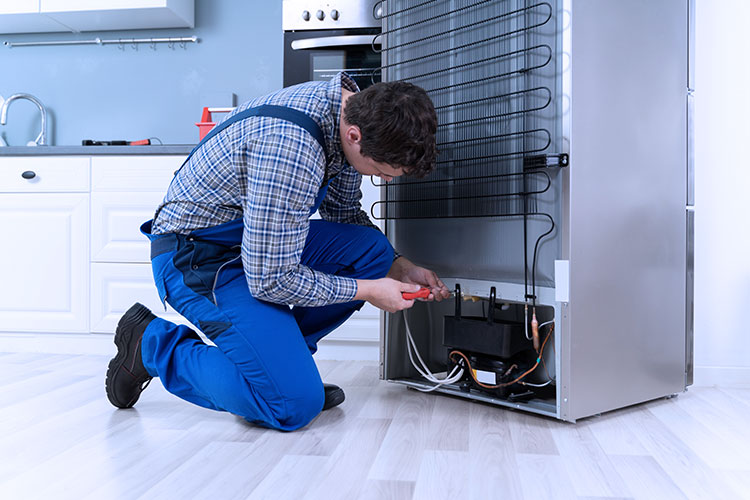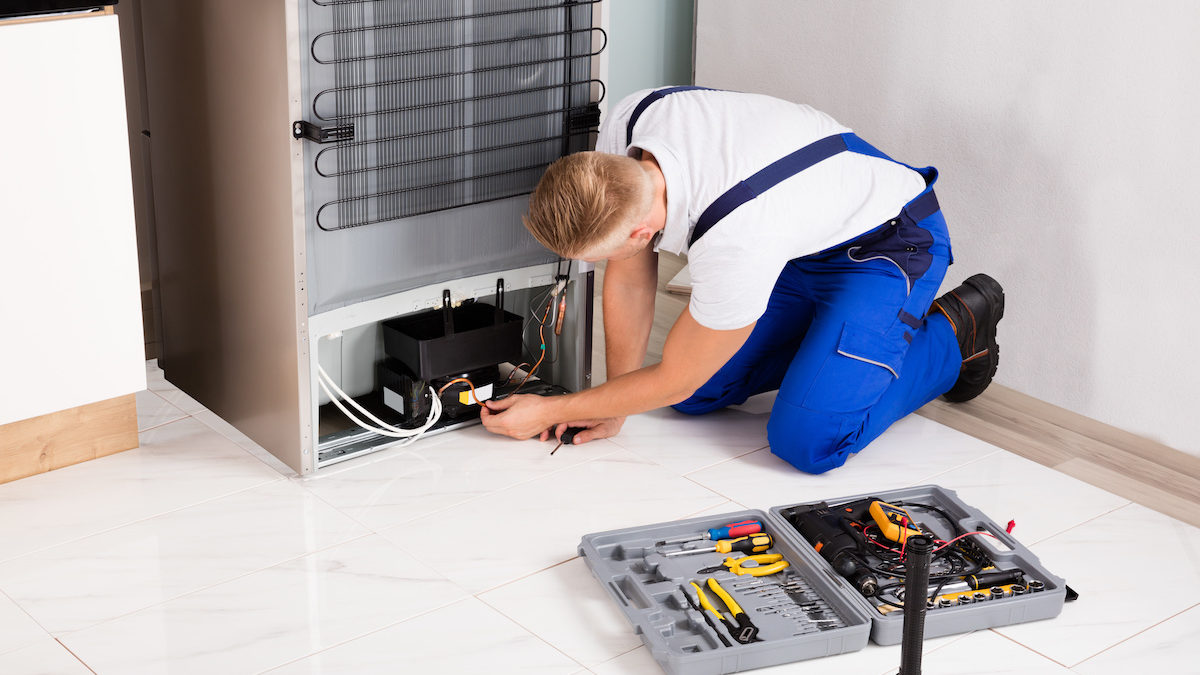Necessary Tips for Effective Ref Repair Work to Extend Appliance Lifespan
When it concerns your fridge, proper repair work and maintenance are essential for long life. You may not recognize exactly how tiny issues can rise if they're left unaddressed. Normal check-ups and easy repairs can save you from costly substitutes down the line. Recognizing common issues and recognizing when to act can make all the distinction. Allow's check out some necessary suggestions that will certainly help you maintain your refrigerator running efficiently for many years ahead.
Understanding Usual Refrigerator Problems
Refrigerators are essential in maintaining your food fresh, yet they can run into an array of common problems that disrupt their efficiency. If you discover food ruining quicker than usual, check the thermostat settings or take into consideration if the door seals are damaged. Identifying these problems early can conserve you time and money in repair services, ensuring your fridge runs smoothly and successfully.
Normal Upkeep Practices
To maintain your appliances running efficiently, you require to remain on top of normal maintenance techniques. Clean the condenser coils, check the door seals, and monitor the temperature level setups to guarantee peak efficiency. These simple jobs can save you time and cash on repair services down the line.
Clean Condenser Coils Consistently
Cleaning your condenser coils consistently can substantially boost your appliance's efficiency. Dust and dirt build up on these coils over time, causing your appliance to work harder and eat even more power. To maintain them clean, unplug your appliance and meticulously get rid of any kind of safety covers.
Check Door Seals
3 basic steps can help you ensure your home appliance's door seals are in good condition. 2nd, tidy the seals making use of cozy, soapy water to remove any particles or crud. By complying with these steps, you'll maintain your home appliance's effectiveness and longevity, saving you money on power costs and fixings in the long run.
Monitor Temperature Setups
On a regular basis checking your appliance's temperature setups is important for ideal efficiency and efficiency. Whether you're taking care of a refrigerator, freezer, or stove, keeping an eye on these setups can prevent many problems. For fridges, go for temperatures in between 35 ° F and 38 ° F; for freezers, linger 0 ° F. If the temperature levels are too expensive or low, your appliance may work harder, squandering power and shortening its lifespan. Use a thermometer to check these setups regularly, especially after significant modifications, like relocating your home appliance or readjusting the thermostat. If you notice fluctuations, adjust the setups accordingly and consult the customer manual for assistance. By remaining aggressive concerning temperature level surveillance, you'll assure your home appliances run efficiently and last longer.
Fixing Air Conditioning Issues
When your fridge isn't cooling down correctly, it can lead to ruined food and threw away cash, so attending to the concern immediately is vital. Begin by examining the temperature level settings to validate they go to the suggested levels, usually around 37 ° F for the fridge and 0 ° F for the fridge freezer. If the settings are correct, examine the door seals for any kind of voids or damages; a defective seal can enable cozy air to enter.
Next, take a look at the vents inside the fridge and freezer. Validate they're not obstructed by food things, as this can interfere with air flow. Listen for the compressor; if it's not running or making unusual noises, it might need attention. Examine the condenser coils, usually situated at the back or base of the system. Dust and particles can build up, triggering cooling down concerns. Tidy them with a vacuum or brush to enhance performance. If issues linger, it could be time to call a specialist.
Dealing With Water Leakage and Ice Build-Up
If you're handling water leak or ice build-up in your device, it's necessary to identify the source of the problem. By determining where the water is originating from, you can avoid further issues and stay clear of expensive repair work. Let's discover some efficient strategies to tackle these usual problems.
Recognize Leakage Resources
How can you successfully identify the resources of water leak and ice accumulation in your home appliances? Start by inspecting the seals and gaskets on your refrigerator and fridge freezer doors. A worn or damaged seal can allow cozy air to get in, creating condensation and ice. Next, inspect the drainpipe pan and drain system for clogs or clogs; a backed-up drain can bring about water merging. Try to find any type of loose connections in the water system line, which can produce leakages. Additionally, take a look at the defrost drainpipe for ice build-up, which might interfere with proper water drainage. By systematically examining these areas, you'll pinpoint the source of the problem, allowing you to take the required steps to repair it and expand your appliance's lifespan.
Avoid Ice Formation
To stop ice formation in your devices, start by confirming the temperature level settings are appropriate. If your refrigerator or freezer is too cool, it can bring about extreme ice accumulation. Examine the door seals on a regular basis; damaged seals can allow warm air i loved this in, causing condensation and ice development.
Maintain the device well-ventilated and avoid overcrowding, as this can block airflow - Best Appliance Repair Company In Oro Valley Dependable Refrigeration & Appliance. Likewise, regularly thaw your freezer if it does not have an automated defrost function.
If you observe water leak, determine and repair any type of blocked drainage holes, as they can add to ice build-up. Tidy the coils and validate they're functioning appropriately to keep peak performance. Taking these steps will certainly assist extend your home appliance's life expectancy and efficiency.
Resolving Noisy Fridge Seems
While it may appear alarming, a loud fridge frequently signals small problems instead than significant malfunctions. Identify the resource of the noise. Typical offenders consist of the compressor, Get More Information followers, and water lines. If you hear a buzzing audio, it may be the compressor working hard; this can simply be a normal operation audio.
Next, check for loosened products inside. In some cases, containers or racks can rattle, creating undesirable sound. Tighten or rearrange them to remove the noises.
If you discover a clicking sound, it may be the defrost timer. This is commonly safe however could show it requires evaluation.
Finally, validate your fridge is level. An out of balance home appliance can generate vibrations and noise. Make use of a degree to check, and change the feet if required. Addressing these problems quickly can aid maintain your fridge's performance and prolong its lifespan.
When to Change Parts vs. Complete Replacement

However, if your home appliance is older and experiencing several problems, a full replacement can be a lot more cost-effective. Think about the expense of fixings versus the device's value. If repairs exceed 50% of a brand-new system's price, it's usually smarter to purchase a replacement. Furthermore, if you notice continuous problems that maintain reoccuring, it's a sign that your home appliance has actually reached completion of its life. Consider these variables meticulously to make the most effective choice for your needs and budget plan.
Understanding When to Call an Expert
Exactly how can you inform when it's time to hire a professional for appliance repair service? If you discover unusual sounds, smells, or leaks, it's a clear signal that something's wrong. Do not disregard these signs; they often indicate deeper problems. If your home appliance quits working altogether or frequently trips circuit breakers, it's another red flag.
You must also consider your own comfort level with fixings. If you're unclear regarding detecting the trouble or do not have the right tools, it's ideal to connect for assistance. Bear in mind, trying complicated repairs can lead to even more damage and even safety dangers.

Frequently Asked Questions
Exactly how Often Should I Clean the Fridge Coils?
You ought to cleanse your fridge coils every six months. This assists keep effectiveness and prevents getting too hot. If you discover too much dust or family pet hair, tidy them much more frequently to assure your refrigerator runs efficiently.

Can I Use Vinegar for Cleansing My Refrigerator?
Yes, you can utilize vinegar to clean your fridge! It's an excellent all-natural cleaner that eliminates smells and stains. Dependable Refrigeration & Appliance Repair Service LG Appliance Repair. Just blend it with water, apply it to surfaces, and wipe down for a fresh, tidy fridge
What Temperature level Should My Refrigerator Be Set To?
You should set your refrigerator to 37 ° F(3 ° C) for perfect food conservation. This temperature level official website keeps your food fresh while preventing perishing, guaranteeing your grocery stores last longer and lowering waste. It's a simple adjustment you can make!
Does a Fridge Need to Be Leveled?
Yes, your fridge requires to be leveled. If it's irregular, it can influence cooling down effectiveness and cause excess sound. Inspect the progressing legs and adjust them to guarantee correct equilibrium for perfect performance.
Exactly How Can I Reduce Refrigerator Power Usage?
To decrease your refrigerator's energy consumption, keep it tidy and well-ventilated, check door seals for leaks, set the temperature in between 35-38 ° F, and prevent overloading it. These steps can considerably lower your power expenses.